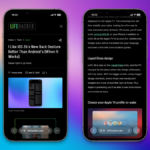Transitioning from Google Assistant to Gemini AI: Key Changes Ahead
For quite a while, it has been evident that the Gemini AI application is poised to take over Google Assistant. This transition became inevitable as Gemini became proficient and received the necessary integrations with other applications. Presently, Google is actively removing features associated with Google Assistant in anticipation of its eventual phase-out.
According to an official support document from Google, highlighted by 9to5Google, several Google Assistant functionalities have recently been disabled across Android devices and Nest speakers and displays. This development adds to the list of features that were removed last year.
For users with smart displays, the ability to use voice commands to favorite, share, or inquire about your photos—such as when and where they were taken or to access photo frame settings—has been discontinued. Now, accessing this information will require navigating through Google Photos or the settings panel on the smart display.

Credit: Google
Moreover, another feature that is being phased out is the interpreter mode, which allowed users to engage in real-time translation conversations. While this mode remains functional in the Google Translate application, it is not yet supported in Gemini.
When it comes to Google Assistant Routines, the option for birthday reminders is also disappearing in these scheduled actions. Additionally, daily updates and Family Bell announcements are being removed, with Google suggesting that users switch to Routines instead. Furthermore, Google Assistant will become incompatible with car accessories that utilize Bluetooth or AUX connections.
Google has stated that these revisions are aimed at “focusing on the experiences you cherish and improving the technology that underpins them,” while also phasing out “less utilized features.” However, considering the recent official communication announcing that Google Assistant will be replaced by Gemini on smartphones before the conclusion of 2025, it appears there will be minimal future investment in the existing assistant software.
What do you think about these changes?

Credit: Google
In the upcoming months, users with devices featuring a minimum of 2GB of RAM and running Android 10 or later will see Google Assistant disabled, directing them towards Gemini instead. This shift has already taken effect on newer devices like the Google Pixel 9.
Google has also indicated that enhanced experiences powered by Gemini will be introduced on additional devices, including smart speakers and televisions, in the foreseeable future. While the transition for these devices may take some extra time, it is inevitable, making it prudent for users to start familiarizing themselves with Gemini wherever possible.
There’s still considerable work to be done on Google’s end: for instance, Routines, which allow users to execute several actions through a single voice command, have yet to be integrated into Gemini. It’s likely that more features from Google Assistant may be phased out in the months ahead.












